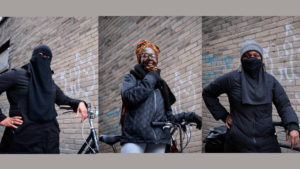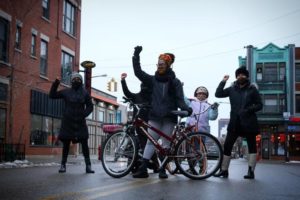In June 2020, GObike Buffalo made an explicit and public commitment to advance our values of equity and inclusion in our operations and our community. We are sharing some critical updates to hold ourselves accountable and demonstrate that change is not only necessary but possible and measurable.
What is mobility justice? The ability of marginalized groups to move easily, fairly, and unafraid.
While we know there are more places for us to take leadership in equity, we also acknowledge there are places we need to step back to create space for leadership from communities and organizations of color. As a result, GObike will be playing a supportive role in a new initiative led by Colored Girls Bike Too addressing mobility justice in our region.
Internal Equity Work
This past summer, GObike’s staff conducted six weeks of anti-racism learning and reflection utilizing Me and White Supremacy by Layla Saad to guide the conversation. We have begun implementing a racial equity impact analysis in our decision making, starting with job posting, hiring, and personnel procedures evaluated through this lens. We have also hired an engagement coordinator to focus on communities of color that are not sufficiently represented in our organization.
We have also seen how a racial equity lens can strengthen and sharpen our external work. GObike has joined the Black-led Fair Fines and Fees Coalition to ensure that fines are fairly imposed and enforced, to eliminate fees, and to end exploitative traffic enforcement practices in Buffalo. We have also helped with the intentional diversification of the City of Buffalo’s Bike and Pedestrian Advisory Board to ensure representation from communities disproportionately impacted by access barriers and traffic violence.
While we know there are more places for us to take leadership for racial equity, we readily acknowledge there are places we need to step back to create space for leadership from communities and organizations of color.

